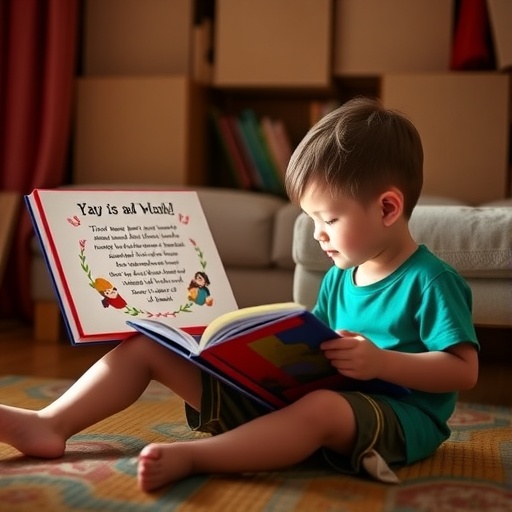In recent years, the significance of promoting altruistic behavior in children has gained considerable traction among educators, psychologists, and parents. One innovative approach gaining attention is the use of personalized storybooks. A recent study by Kotaman and Balcı sheds light on this methodology, exploring the profound impact personalized narratives have on enhancing children’s altruistic sharing behaviors. This groundbreaking research indicates that storytelling, when tailored to an individual child’s experiences and environment, can be a powerful catalyst for nurturing compassion and generosity in young minds.
At the core of this study lies the concept of personalization in literature. The researchers suggest that when children see themselves represented in stories, the emotional connection they develop is noticeably stronger. Personalized storybooks allow children to relate to characters and situations authentically. This relatable context serves as a valuable blueprint, encouraging children to emulate the prosocial behaviors depicted. The implications of this are significant, as they suggest that tailored storytelling could be systematically used to foster moral development from an early age.
The study conducted by Kotaman and Balcı meticulously examines the interaction between personalized storytelling and children’s subsequent sharing behavior. It comprises a diverse sample of children, aiming to provide a comprehensive look at various ages and backgrounds. Through structured experiments, the researchers measure changes in sharing tendencies before and after exposure to personalized texts. This methodical approach enabled them to draw strong correlations between individualized stories and increases in altruistic behaviors.
A fascinating aspect of the findings is the demonstration of immediate and long-term effects. Not only did the children display heightened sharing immediately after engaging with their personalized books, but follow-up assessments revealed that these behaviors persisted over time. This suggests that storytelling is not merely a momentary influence; it has the potential to leave a lasting imprint on children’s values and actions. Such long-term impacts underscore the need for incorporating personalized narratives into educational curricula.
Moreover, the researchers delve into the psychological mechanisms underpinning these effects. They propose that personalized storybooks increase empathy by providing a reflective understanding of the characters’ emotions and situations. This empathetic engagement is crucial for developing altruism, as it allows children to grasp the importance of considering others’ perspectives. The study suggests that the narrative structure, combined with personalization, effectively enhances emotional intelligence in children.
Integrating these findings into everyday practices presents exciting possibilities. Early childhood educators can utilize personalized storybooks as a tool for not only literacy development but also for moral education. By selecting stories that reflect their students’ individual experiences, teachers can create an engaging environment that promotes discussion around kindness, sharing, and compassion. This dual-focus on academic and emotional learning could revolutionize early education methodologies.
The research also emphasizes the role of parents and caregivers in this narrative exploration. Engaging children in the storytelling process—whether by crafting personalized tales together or discussing the values presented in the stories—can amplify the effects observed in the study. This collaborative approach fosters deeper connections and discussions between children and adults, further instilling values of altruism and cooperation within a familial setting.
Critics may question the practicality of personalized storybooks, particularly in resource-limited environments. However, the study provides suggestions for creating simple, personalized narratives using readily available materials. For instance, educators can create template books where children take the lead in outlining their own stories, incorporating elements from their lives. This not only facilitates personalization but also enhances creativity and narrative skills.
As research in this domain progresses, it’s essential to continue evaluating the ethical implications of using personalized narratives. Questions arise about the subliminal messages children receive through the stories they engage with. Researchers urge the importance of developing positive, constructive stories that emphasize altruistic values without veering into moralistic dictation. Establishing a balanced approach to storytelling will ensure that the emotional and educational benefits of personalized books are maximized without creating undue pressure or expectations on young readers.
Exciting trends in technology are also relevant to this area of research. With the advent of digital publishing and AI, creating personalized storybooks may soon become an accessible option for many families. Authors and publishers can harness algorithms to generate stories unique to every child’s profile, ensuring the themes resonate with their everyday experiences. This technological evolution could make personalized narratives commonplace in homes and classrooms globally.
In conclusion, the research on personalized storybooks exemplifies a groundbreaking intersection of literacy and altruism. Kotaman and Balcı’s study illuminates the potential for storytelling to shape children’s social behaviors, reinforcing the notion that literature can be a transformative tool for moral education. As this body of research continues to grow, it is vital for educators, parents, and policymakers to consider how personalized narratives can be integrated into learning environments, promoting a generation of empathetic and generous individuals.
The implications extend far beyond mere sharing; they touch on the very foundations of social interaction, cooperation, and community values. By embracing personalized storybooks, society can foster not only better readers but also more compassionate citizens. The study’s revelations encourage us all to put empathy at the forefront of education, ensuring that our future generations thrive both intellectually and morally.
Subject of Research: The impact of personalized storybooks on children’s altruistic sharing behavior.
Article Title: The Impact of Personalized Storybooks on Children’s Altruistic Sharing Behavior.
Article References:
Kotaman, H., Balcı, A. The Impact of Personalized Storybooks on Children’s Altruistic Sharing Behavior.
Early Childhood Educ J (2025). https://doi.org/10.1007/s10643-025-01976-x
Image Credits: AI Generated
DOI: 10.1007/s10643-025-01976-x
Keywords: Personalized storybooks, altruism, children’s literature, empathy, moral development, early childhood education, social behavior, sharing behavior.




